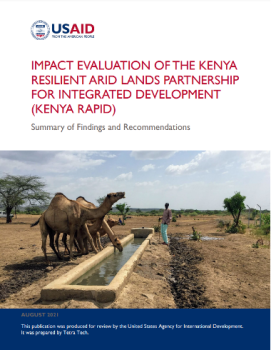Kenya Resilient Arid Lands Partnership for Integrated Development (RAPID) Activity: Impact Evaluation: Summary of Findings and Recommendations
The Kenya Resilient Arid Lands Partnership for Integrated Development (RAPID) was a US$35.5 million public-private partnership/Global Development Alliance activity implemented from 2015 to 2020 and funded jointly by USAID, Swiss Agency for Development and Cooperation (SDC), private sector partners, and Millennium Water Alliance (MWA) members. One piece of Kenya RAPID’s broader suite of activities involved the installation of sensors on water borehole pumps to transmit information to data dashboards in real-time to improve water management. This Information and Communication Technology (ICT) intervention was paired with budget facilitation for borehole pump repairs and clarification of roles and responsibilities to create dedicated pump maintenance teams. Of the 400 sensors installed on water borehole pumps, a subset of 69 sensors were installed on “strategic” water boreholes, or boreholes that local authorities identified as important due to the risk of drought in the borehole area.
The USAID/Kenya and East Africa (USAID/KEA) mission in conjunction with SDC commissioned a quasi-experimental impact evaluation to understand the effect of Kenya RAPID’s ICT intervention on strategic borehole pump use and functionality during drought periods. The evaluation team used a propensity score matching design to match strategic boreholes in Kenya RAPID’s five implementation counties with a set of 132 strategic boreholes across eight comparison counties. The evaluation team installed sensors on the comparison county borehole pumps to compare how long borehole pumps ran in a given day on average. The evaluation team supplemented this quantitative analysis with qualitative interviews and focus group discussions to understand how water managers perceived the impact of the sensor-based system and to see whether or not user perceptions of borehole pump functionality and access changed.
This report was developed by USAID’s Water, Sanitation, and Hygiene Partnerships and Learning for Sustainability (WASHPaLS) project alongside a comprehensive final report that presents the results of the impact evaluation of Kenya RAPID’s borehole sensor intervention. The technical brief can be found here.


